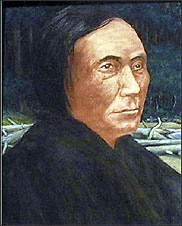Chief Leschi
|
|
Chief Leschi (1808 - 1858) was chief of the Nisqually Native American tribe. He was hanged for murder in 1858.
Leschi was born in 1808 near what is today Eatonville, Washington, to a Nisqually father and a Yakama mother. He was appointed chief by Isaac Stevens, first governor of Washington Territory, to represent the Nisqually and Puyallup tribes at the Medicine Creek Treaty of December 26, 1854, which ceded to the United States all or part of present-day King, Pierce, Lewis, Grays Harbor, Mason, and Thurston Counties and stipulated that the Native Americans inhabiting the area move to reservations. Leschi either refused to sign (and had his "X" forged by another) or signed under protest--the historical record is unclear on this point.
The next year, Leschi traveled to the territorial capital at Olympia to protest the terms of the treaty, but was rebuffed. In October 1855, Governor Stevens ordered that Leschi and his brother Quiemuth be taken into "protective custody" and sent the militia after them, thereby touching off the Indian Wars of 1855-1856. Leschi became war chief, in command of around 300 men. In the course of the conflict U.S. Army Colonel Abraham Benton Moses was killed. After the war ended on August 5, 1856, Leschi was taken into custody, and his brother turned himself in. Quiemuth was murdered on November 18, 1856, by an unknown assailant, in Governor Stevens's office, where he was being held for the night on his way to the jail at Fort Steilacoom, now in Lakewood, Washington. Leschi himself was put on trial in 1858 for the murder of Colonel Moses, which he denied having committed. His first trial resulted in a hung jury because of the judge's instruction that killing of combatants during wartime did not constitute murder. He was convicted and sentenced to death in a second trial in which this instruction was not given and his lawyers (among whom was Bing Crosby's grandfather) were not allowed to introduce potentially exonerating evidence. During the trial, he is reported to have said, through an interpreter,
- I do not know anything about your laws. I have supposed that the killing of armed men in wartime was not murder; if it was, the soldiers who killed Indians are guilty of murder too....
- I went to war because I believed that the Indian had been wronged by the white men, and I did everything in my power to beat the Boston soldiers, but, for lack of numbers, supplies and ammunition, I have failed.
- I deny that I had any part in the killing....As God sees me, this is the truth.
The United States Army refused to carry out the sentence of death on the grounds of Fort Steilacoom, maintaining that he was a prisoner of war. The territorial legislature therefore passed a law authorizing Leschi's execution at the hands of civilian authorities. On February 18, 1858, Leschi was hanged near Steilacoom Lake in what is today the city of Lakewood. The hangman is reported to have later said "I felt then I was hanging an innocent man, and I believe it yet."
Though Leschi is said to have participated in the Battle of Seattle on January 26, 1856, Frederick J. Grant nevertheless named the Leschi neighborhood in Seattle after the chief in the late 1880s. Today, the neighborhood and its waterfront park; schools in Seattle and Puyallup; and streets in Seattle, Lakewood, Steilacoom, Anderson Island, and Olympia, bear his name.
In March 2004, both houses of the Washington state legislature passed resolutions stating that Leschi was wrongly convicted and executed and asking the state supreme court to vacate Leschi's conviction. The court's chief justice, however, has said that this is unlikely to happen, since it is not at all clear that the state court has jurisdiction in a matter decided 146 years earlier in a territorial court. In December 2004, Chief Leschi was cleared by a unanimous vote by a Historical Court of Inquiry.
External links
- Washington State Senate Resolution 8727 (http://www.leg.wa.gov/pub/billinfo/2003-04/senate/8725-8749/8727_03042004.txt)
- Washington State Senate Joint Memorial 8054 (http://www.leg.wa.gov/pub/billinfo/2003-04/senate/8050-8074/8054_02112004.txt)

